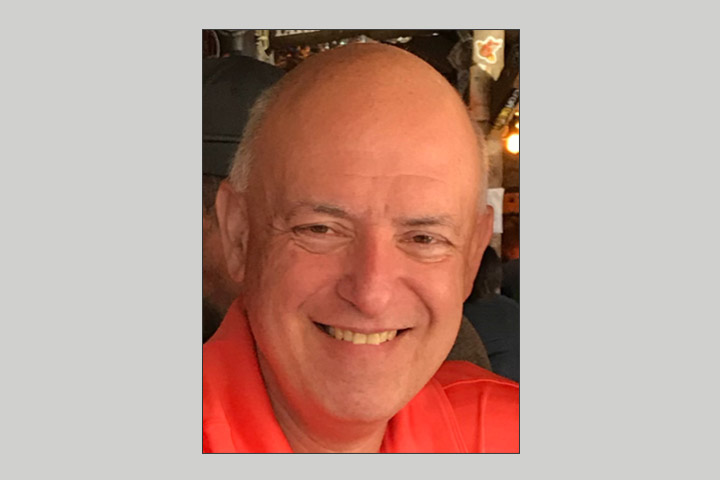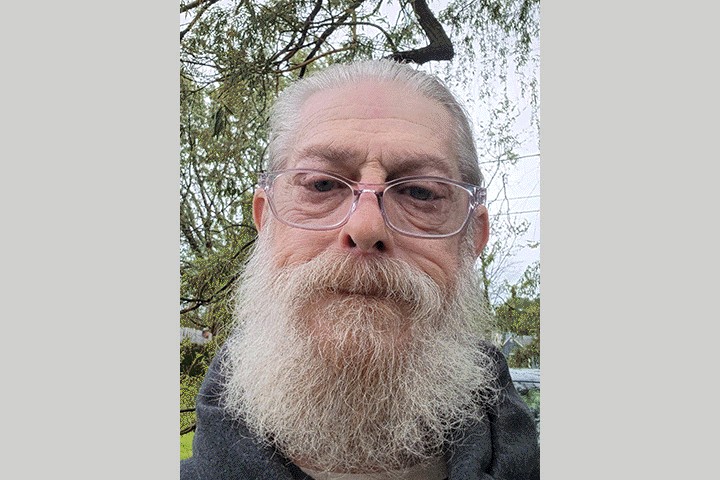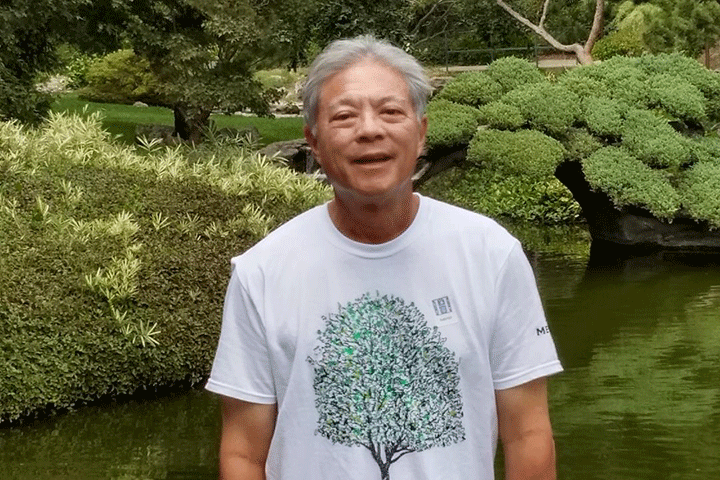Pitching a Perfect Game Against Pancreatic Cancer

- Unexplained stomach problems lead to pancreatic cancer diagnosis
- Presurgical chemotherapy, then a pancreatectomy
- Post-surgical chemotherapy
- Facing recurrence
Did you ever stare death in the face? Let me tell you, it isn’t fun.
On July 19, 2018, I was diagnosed with pancreatic cancer at the age of 53. As a physician, I knew this was bad. Only 9 percent of people with this dreadful disease live more than five years after their diagnosis and most die within 18-24 months. So how am I able to write about it over a year later? Mostly luck I suppose, but there were many people who were instrumental in helping me get through this. And if you know me you can guess that sports were involved.
Before I go any further I want to make it clear that without the support of my wife Norma and my kids Tom and Donna, I don’t know if I would have been able to get as far as I have gotten. My family, friends, co-workers, doctors, and nurses all played a huge role in it, too. This story is about my passion for sports, keeping a positive attitude, and how someone who barely knew me gave me encouragement, hope, and something to look forward to.
Our family had been through some tough times in the previous months. We lost my father-in-law, our beach house (I know I am lucky to have one) was destroyed by a flood from frozen pipes, and our family dog had to be put down. My turn came when I got sick all over my car doing 75 mph on the NJ Turnpike on May 1. The doctor found a small bowel obstruction and I got better. It took me until Memorial Day to get an idea that something serious was wrong, when I threw up again and went to the ER for a second time.
My CT scan showed that my pancreatic duct was 1 mm too big. Do you realize how small that is? They couldn’t see a tumor on the scan. I went for an MRI and still no tumor, but it confirmed the size of the abnormal duct. Finally, after six weeks, an endoscopy with ultrasound found the mass.
Deciding on a Course of Treatment
The next two weeks were a whirlwind. Consults at Fox Chase Cancer Center (Philadelphia) and Memorial Sloan Kettering Cancer Center (New York). Life decisions to be made. Treatment options to decide upon. A plan was devised. I chose treatment at Fox Chase, with Dr. Namrata Vijayvergia as my oncologist and Dr. Andreas Karachristos (now at University of South Florida, Tampa) as my surgeon.
Last day of work on August 1st. Port placement and chemo with FOLFIRINOX starting on August 2nd. Five planned treatments taking me to the end of September, repeat the CT scan, then make more decisions regarding surgery and further chemo. It was not going to be fun. Four chemo agents, each with its own long list of side effects, once every two weeks. Six hours at the hospital followed by 48 hours at home with the last medication running in. If all went according to plan I would be done with everything in nine short months.
I tried to remain positive, but it was tough. The thought of what was ahead of me was daunting. Nine months of treatments; nine months of feeling rotten. How was I going to get through it? I decided that I just had to put my head down and plow through.
As my wife knows, I relate everything to sports, so this was no different. Pitcher was my position when I played baseball, and what’s the ultimate thing a pitcher can do? Pitch a perfect game. If I was going to survive this I had to pitch the first perfect game of my life. Nothing could go wrong. Make the day I found out about the cancer the worst day.
Luckily for me the beginning of August also marked the start of fantasy football season. I wondered if I was going to be up to drafting in my four usual leagues. Yes, I was thinking about fantasy football. But that’s what made the days go by.
Fantasy Sports Distract Me From Treatment
I immersed myself in fantasy football. I listened to my favorite shows on SiriusXM, but most of all the guy who I alluded to earlier. My man, the Rotobuzzguy, Howard Bender. We had become friends on Twitter, and met in New York City in 2018. When I told Howard about the cancer he offered encouragement. He made me laugh. He asked if there was anything he could do (yeah, most people say that), but what he did next was completely unexpected. He told me that if I got through this, he wanted me to go to Tout Wars (the fantasy baseball league for experts) with him to help draft his team. Having played fantasy baseball for 28 years, I thought I could at least compete with the experts and now I might have the chance.
This was just one of many things I had to look forward to—many far more important than fantasy baseball—that gave me a reason to keep going. My daughter’s graduation in May was the most immediate one. Of course I couldn’t imagine missing any of the life events that we were planning on enjoying, but I couldn’t stop thinking about that draft. I was also wrapped up in preparing for my fantasy football drafts. I needed to keep busy and this was helping, but I had too much time on my hands. I ended up with a total of 10 teams by the time opening day rolled around. The chemo did its job on me and that probably kept the number lower than it could have been.
Howard kept in touch, asking how I was doing, offering advice when I asked. He sent out a Tweet wishing me luck and I heard from many of his followers who also wished me well. The fantasy community’s support was unreal.
On October 1st I had my next CT scan and things looked good. The tumor was smaller and I was tolerating the chemo. The surgeon decided that it was time to operate.
I was so glad to get this thing out of me. It’s disturbing to know that you have a cancer in you and they don’t want to take it out right away. A distal pancreatectomy and splenectomy was scheduled for November 5th, a Monday. My crazy mind was happy it was a Monday because I knew I’d be able to get my lineups in and that I would probably be okay by Thursday to get ready for the next week.
The surgery took eight hours. I messaged Howard from the ICU while watching an awful Monday Night Football game. He was amazed that I was coherent enough to send a message so soon after the surgery. I was too, honestly.
Three Innings of Perfection and the Beginning of the Fourth
I was discharged on Saturday with the nurses telling me they had never seen anyone do so well after that surgery. On the way home I developed double vision. It was a scare, but after an MRI it was deemed something that would resolve in a few weeks and I would have to wear an eye patch until it did. Howard didn’t stop with the pirate jokes.
More good news came in November. The pathology report came back and said that all the cancer was removed and that there was no spread to any of the lymph nodes. My CA 19-9, the tumor marker for pancreatic cancer, had returned to normal as well. This was my immaculate inning: three strikeouts on nine pitches!
While recovering from the surgery, I saw an ad on Twitter from Fantasy Assembly, a website about fantasy sports, looking for writers, no experience necessary. With fantasy football season coming to a close, I needed something else to keep my mind off of the upcoming chemo, and this was it. I applied and was accepted.
The FOLFIRINOX after surgery hit me hard this time. The side effects were much worse. We thought it might be because I was weaker from the surgery, but it knocked me for a loop for a week. I would lie on the couch nauseated, thinking about what I could write about. When I finally felt better, I would write as much as I could before the next round.
Howard read a few of my articles and gave me suggestions that helped tremendously. I was now in my sixth inning of treatment and it was getting rough. But writing and preparing for my drafts were my outlets in the dreary days of winter.
I wrote at least one and sometimes two Fantasy Assembly articles a week while I was between cycles during January and February. To be able to continue to focus on something other than what I was going through was a blessing. I really believe this helped me get through it and make it seem that it wasn’t so bad. But chemo made me so sick this time that I wanted it to stop after the 2nd treatment in late January. I had just spent a week in bed and the thought of doing that again was just not something I felt I could do. When I discussed this with my wife and oncologist they were both adamant that I finish up the treatments even though there was no proof that continuing the chemo was beneficial. The oncologist agreed to reduce the dose a bit hoping that it would decrease the side effects, so I gave it a shot. Reducing the dose helped. And I was accepted to play in The Great Fantasy Baseball Invitational, a league for fantasy baseball “experts,” another good thing that kept me going.
Finishing My Perfect Game
Howard continued to support me. At the LABR fantasy league draft, he gave me a shout-out live on SiriusXM before he announced his pick. This bolstered my spirits as my last treatment was scheduled for two days later. This was a great way to start my eighth inning.
On March 4th I received my last treatment and “rang the bell.” Forty-eight hours later I disconnected the last infusion and was done with treatments. The rest of March was for recovery. My wife and I went to Florida and watched a few Mets spring training games. I met Howard and other members of the fantasy community. Then my wife and I went to Hawaii to really get away from it all and relax. My wife deserved it more than I did. Eight innings down, one to go. Three outs away from that perfect game.
On April 9th I had another CT scan and blood work. The next 48 hours were more anxiety-producing than any I can remember. It was like being on the bench when a perfect game was being hurled. No one spoke about it. We went to the oncologist with pits in our stomachs. Knowing that we were waiting anxiously, as soon as she entered the room Dr. Vijayvergia stated that everything was good. Tumor marker was normal and no evidence of any tumors on the scan. My nine months of treatment were over and it was perfect.
I knew I would have to continue to go back for scans and tests, and I understood that it wasn’t really over—it never is as a cancer patient. And in early July I got bad news: my CA 19-9 went up to 1,600 and we discovered metastases in the liver. The news devastated me, as everything seemed to be going along so well. As a physician of course I knew I wasn’t out of the woods, but I was feeling great, enjoying being back to work and my other activities.
I started treatment with gemcitabine and Abraxane and went for a consult at Johns Hopkins. I am looking for clinical trials to participate in. So far, I have not found any. My CA 19-9 has continued to climb, although at my most recent test, it finally started to drop.
If I didn’t know what was going on inside of me, I’d never know. I have no pain, am feeling well, not losing weight. It’s been very difficult to deal with the recurrence.
My Advice Facing My Next Game
There are so many ways to look at what happened to me and try to explain why I have gotten through treatment the way I have. I did. The support of my wife, kids, family, and friends has kept me smiling as I knew I had the best defense behind me. But being able to use fantasy sports as a diversion in so many different ways, from playing in 10 football leagues, writing about fantasy baseball auctions (I now write for Fantasy Alarm), playing in an “expert” league, and having a friend in the industry who supported me, helped more than you can imagine.
As a doctor who relies on medications to treat patients, it was a lesson learned. A positive attitude and having something else to help keep your mind off the struggles have been invaluable in getting through it all.
No one can get through cancer alone. Anything you can do will help that person get through the day. A text. A call. A card. A visit. I hope this story instills that it’s not only the medicine and surgery that have helped me. If writing this inspires one person to help one other person, I’ve done something good.
Three years after his pancreatic cancer diagnosis, Andrew passed away. He distracted himself from the rigors of treatment by focusing on fantasy football and got extra from friends who reached out. He shared that message—to reach out—with as many people as possible. We offer our deepest sympathy to his family.






